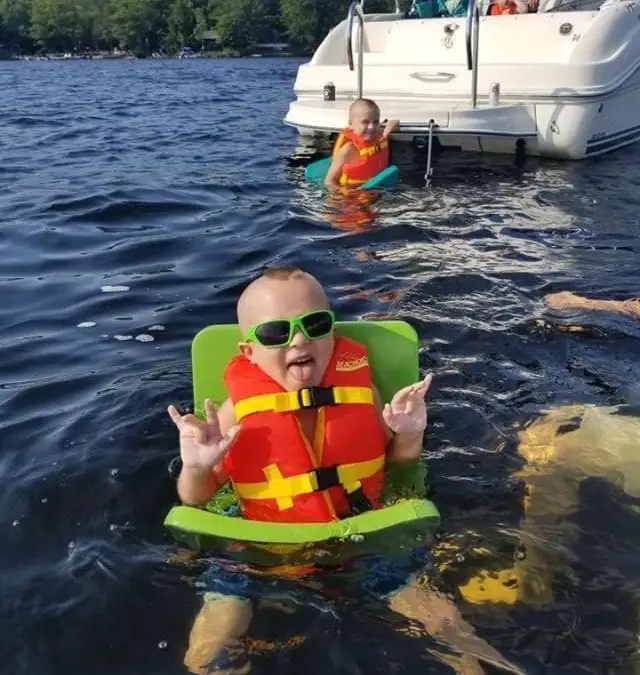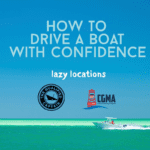YOU ARE RESPONSIBLE FOR YOUR WAKE
Many boaters are unaware of this critical topic. If you create a big wake because you’re going too fast and that wake results in damage to other boats, damage to property or injury to others you will, most likely, be on the hook. Pay attention to the wake you are generating and be aware of your surroundings. The docks or boats you damage, the father and young child in the small boat that capsizes, or the elderly person who injures themselves because of your wake are ultimately, your responsibility. Understanding this will help you be a safer boater.
ALWAYS KNOW WHO’S BEHIND YOU
Often overlooked, it’s just as important to know who’s behind you as it is to know who’s in front of you. Many times, I’ve witnessed near-collisions because one boat doesn’t notice the other slowing down in front of them. This usually occurs when entering a no-wake zone. If you’re aware of who’s behind you, you’re more likely to know if that boat poses a risk and you can move over when slowing down.
SLOWER IS BETTER WHEN DOCKING
I’ve mentioned this one before but I can’t emphasize it enough. Slow speeds rarely result in more damage. Fast speeds when panicking always result in more damage or near misses. If you’re trying to dock and you feel it getting away from you then relax, go slow and be prepared with fenders or a boat hook to protect anything you may hit. Regroup and re-try. Aside from your ego, you’ll be fine. Truth be told, using a fender and a boat hook will earn you points because it shows others you know what you’re doing.
WEAR A LIFEJACKET (ESPECIALLY, AT NIGHT)
Wearing a lifejacket is the safest thing you can do on a boat. I recognize that people don’t wear them enough (I’m guilty) but the fact is you, often, don’t have the luxury of knowing when an accident is going to occur. Hitting a submerged object that throws you out of the boat, hitting your head while losing your balance and falling overboard due to a large boat wake or being blind-sided by a jet skier who’s not paying attention can all result in you being in a “man-overboard” situation before you know it (or never knowing it because you’re unconscious). While this is important during the day, it’s even more important when boating at night. Low or no visibility can turn a minor issue into a huge issue. Although I am guilty of not wearing a lifejacket enough during the day, I NEVER go without one at night.
CLICK HERE FOR 10 TIPS TO MAKE YOUR BOATING BETTER
KNOW HOW TO SAFELY CROSS BOAT WAKES
Crossing boat wakes seems like such a simple maneuver and it is, unless the wakes are large and you’re not paying attention. Hitting large boat wakes at high speed or at the wrong angle can easily injure people onboard. Take the wakes at slow speed and at a slight angle. Also, it’s important to familiarize yourself with different boat types and the resulting wakes generated. That will help you prepare in advance for the wake you’re about to cross. In addition, understand that wakes are much bigger and steeper the closer they are to the back of the boat generating them.
EXPECT THE UNEXPECTED WHEN NEAR JET SKIERS
Jet Skis are pretty cool inventions and even cooler when driven by capable, seasoned riders. It seems that for every good jet-skier there are numerous bad ones. It’s likely because so many people who ride jet skis are renters or are inexperienced. As a result, people on jet skis often don’t pay attention to other boaters around them and are HIGHLY likely to make sudden, quick turns without warning. Pay greater attention when boating around jet skis.
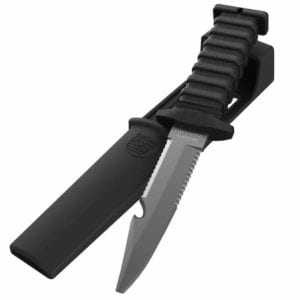
ALWAYS CARRY A KNIFE ON BOARD
It seems like this would be the opposite of safety however, there are two situations where having a knife can be a lifesaver. The first is if your anchor gets stuck and there’s no way you can retrieve it. If you don’t have a knife to cut the rope you could be stuck for a long period of time or in a dangerous situation. The other use for knife is to cut line that’s wrapped around a propeller or locked on a cleat during a falling tide. In these situations, having a knife can save the day.
VISUALIZE POTENTIAL PROBLEMS BEFORE THEY HAPPEN
This seems like it may be overkill but it’s a good idea to think about potential problems that could arise before they happen. This will help you to react vs. think (saving you vital time) should a bad situation materialize. It will also help you to be more aware of your safety and, consequently, a better boater.
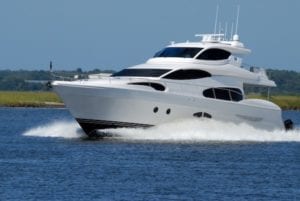
KNOW YOUR BOAT
Understanding how your boat behaves and its characteristics is important. For example, know how your boat handles certain conditions. Does it produce a big wake? Is the engine reliable? Do you have enough fuel to make it to your destination and back? Would you trust it to go offshore? Are the through-hull fittings working properly? Is the bilge pump working properly? You get the picture.
CLICK HERE FOR THE BEST BOATS FOR FLORIDA
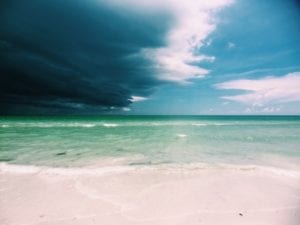
WEATHER, WEATHER, WEATHER
Of all the items listed, knowing the weather is probably the most important item (second to wearing a life jacket). Nothing can change a day from awesome to awful like the weather can. Take the time to understand the weather forecast throughout the day. It’s essential for your safety! Will there be thunderstorms? If so, when? How severe? What direction will they come from? If it’s an approaching cold front will the wind be high from a certain direction before and after the front comes through? Is fog expected? You get the point. Listen to the marine forecast for your area before heading out (or read it online). It’s something that can make or break your outing and can be much more informative than watching the local news.

